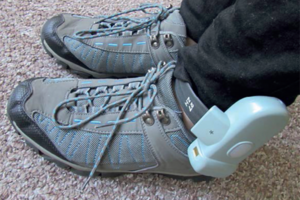Tens of thousands more criminals to be tagged to cut crime and protect victims
Almost 26,000 extra offenders will be tagged over the next 3 years under an ambitious £180 million plan to expand the use of electronic monitoring to cut crime.

- new £183 million investment to support near doubling of number of people on tags
- GPS tags to deter thieves and burglars and help protect domestic abuse victims
- dedicated £19 million fund to promote innovation and new technology
Around ten thousand of those will be prolific robbers, thieves and burglars fitted with GPS tags as they come out of prison. This world-first project – which began in April – expanded to half of England and Wales last week and will now be funded for a further three years. It recently saw the first conviction using location data to pin a thief to the scene of further crimes and is deterring others from reoffending. The intention is to roll it out nationwide, if successful at curbing crime and helping police catch offenders.
In another world-first, alcohol monitoring tags will also be used on more than 12,000 prison leavers known to commit crimes when under the influence over the same period - helping keep them off alcohol altogether or limit their drinking to reduce the risk of them reoffending. It follows their successful use on offenders serving community sentences since last October to help cut the £22 billion cost of alcohol-related crime.
Over 3,500 high-risk domestic abusers will have their whereabouts monitored using GPS tags to protect victims and children from further trauma. The tags may also help the Probation Service discover relationships that offenders are keeping secret so they can alert new partners.
The £183 million investment will help almost double the number of people tagged at any one time from around 13,500 this year to approximately 25,000 by 2025.
Deputy Prime Minister, Justice Secretary and Lord Chancellor, Dominic Raab MP said:
This major increase in high-tech GPS tagging will see us leading the world in using technology to fight crime and keep victims safe.
From tackling alcohol-fuelled violence and burglary to protecting domestic abuse victims, we are developing tags to make our streets and communities safer.
A £19 million Innovation Fund will be used to test different ways of using existing technology to cut crime and foster the development of new types of tags. An area of particular interest is whether new technology could be developed which would notify police or probation staff if an offender has been taking illegal drugs.
GPS tags have been used nationwide since 2019 to monitor offenders’ compliance with licence conditions and court requirements, including exclusion zones. Judges can order them as part of bail conditions and the Home Office will increase its use of GPS tagging devices for foreign national offenders to monitor 4,500 at any one time by the end of next year.
Alcohol monitoring tags, which measure alcohol levels in sweat, have been ordered for over 1,500 offenders serving community sentences since they were first rolled out in October last year.
Notes to editors
- In the Acquisitive Crime GPS tagging project, GPS tags are fitted to eligible burglars, robbers and thieves serving a sentence of a year or more following their release from prison. This means their whereabouts can be monitored by GPS satellites 24 hours a day for up to 12 months.
- In areas where the scheme is operating, the police submit daily crime data on burglaries, thefts and robberies to a dedicated unit set up in HM Prison and Probation Service. Trained staff then map records of offender movements against the details of the crimes and share the relevant data with the police, helping them to eliminate or investigate suspects and prosecute further offences.
- The programme launched in Avon and Somerset, Cheshire, Gloucestershire, Gwent, Humberside and West Midlands on 12 April.
- This expansion last week (29 September) saw it introduced to Bedfordshire, Cumbria, Derbyshire, Durham, Essex, Hampshire, Hertfordshire, Kent, North Wales, Nottinghamshire, Sussex and Greater London (City of London and Metropolitan Police areas).
- The use of GPS tagging in this way is being evaluated and if it proves effective at reducing reoffending and helping police identify perpetrators it could be rolled out nationwide.